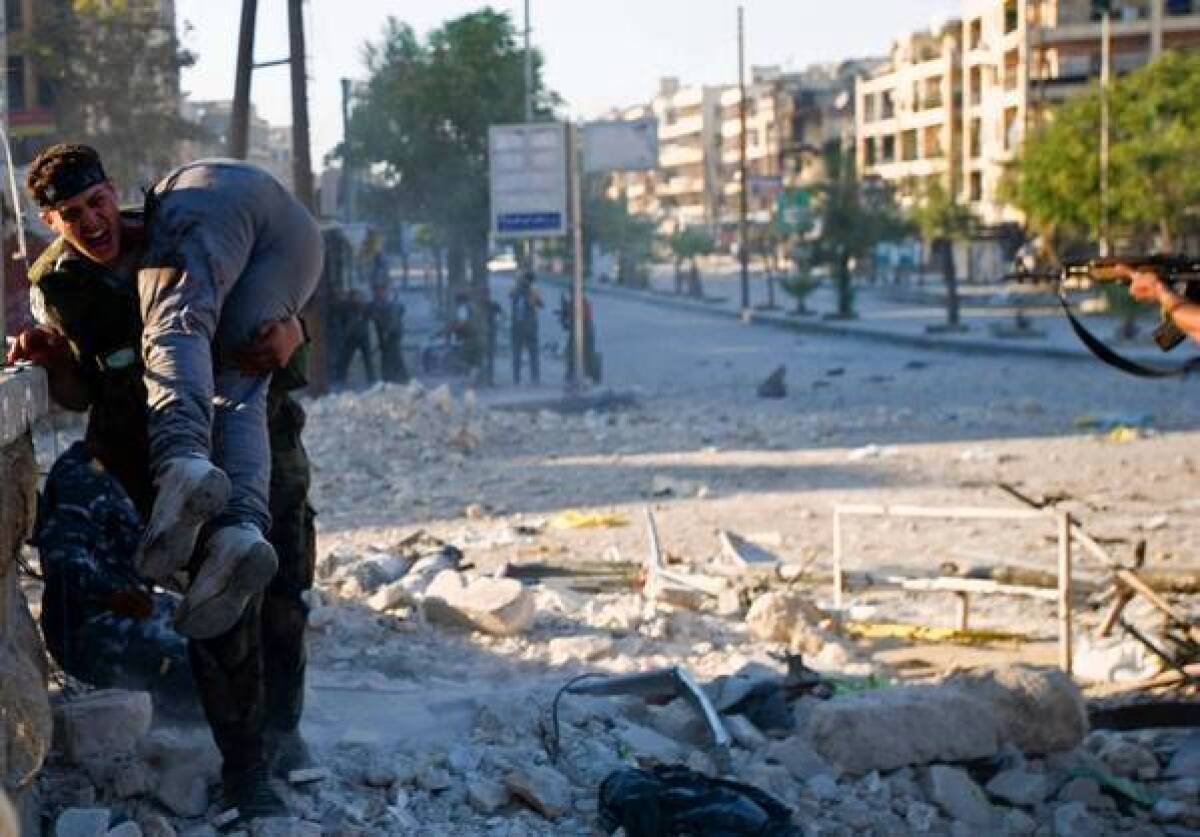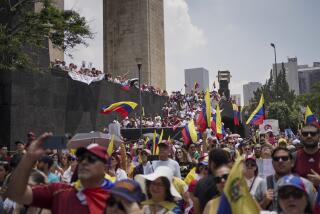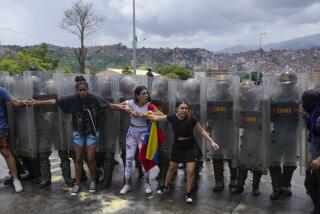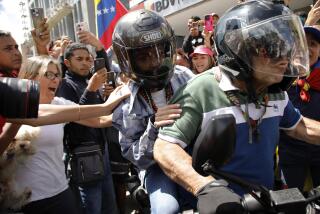Syria President Bashar Assad appears confident of victory

BEIRUT — He flashed a smile and seemed at ease. He vowed victory even though it wouldn’t happen any time soon.
Syrian President Bashar Assad looked confident in a televised interview aired Wednesday, his first since escalating attacks by opposition forces last month seemed to threaten his hold on power. The interview appeared aimed at conveying an image of strength and steadfastness to a jittery populace, as Assad made the case that government forces had broken the rebels’ momentum and were now pushing opposition forces back.
“We are engaged in a regional and global battle, so we need some time to win it,” Assad said, adding, “We are progressing. The situation on the ground is better. But we have not yet won. This will take more time.”
Defeating opposition forces, he said, would entail a long, grueling struggle.
“I am here with you in Damascus, in the presidential palace,” he pointedly told the interviewer with the pro-government Addounia channel, who ventured to inquire why the president hadn’t been seen publicly more often during these trying times.
Opposition activists immediately dismissed Assad’s comments as misguided and misleading, if not delusional.
Significant swaths of the country, including parts of the three major metropolitan areas, Damascus, Aleppo and Homs, remain essentially under rebel control or are contested terrain. Assad’s once-imposing army is weary, over-extended and suffering from a high number of casualties and large-scale desertions. Major highways are cut off and the nation’s economy is in free-fall.
For Syria’s embattled president, however, there may be some positive developments that transcend the now-familiar video images of bombarded cities, maimed civilians and charred border posts and police stations
The interview showed that he had not been chased from the capital, as rumors had suggested since the bombing last month that killed four of his top security aides, including his brother-in-law. The crackle of gunfire and the rumble of artillery may now be part of the capital’s daily soundtrack, but the president boasted that he had not run away.
In addition, neither Damascus, the capital, nor Aleppo have fallen to the rebels, as some suggested could happen when insurgent offensives erupted in the two major cities last month. A brutal counter-offensive in the capital appears to have beaten rebels back to the suburbs, where Assad’s troops are now relentlessly pursuing them and their civilian supporters.
In Aleppo, the military, using air power and artillery, appears to have pushed back opposition brigades that seemed to slip into city neighborhoods so seamlessly six weeks ago, confidently proclaiming that victory was imminent. Many Aleppo residents have been outwardly hostile to the rebellion, a fact that seems to have surprised some opposition fighters.
Some Syrians still view Assad’s continued presence as the only hope to avoid Iraq-style anarchy and sectarian slaughter, a fear his government has worked hard to spread.
“The fate of Syria is in the hands of the Syrian people,” said Assad, who also lauded the “heroic” military.
He scoffed at a slew of recent high-level defections as “self-cleansing” and positive. He even seemed to display a forgiving side, urging citizens to encourage wavering rebels to return to the government fold.
“The nationalistic and good person does not rebel or go against his nation,” said Assad, who reiterated his long-held contention that a foreign conspiracy was behind the uprising, now in its 18th month. The Syrian leader, surveying the international landscape, may see other signs of hope.
The specter of foreign intervention — the one action that could decisively tip the battle in the rebels’ favor — seems ever more remote.
On Thursday, the United Nations is scheduled to talk about Turkey’s request that a buffer zone be declared in Syria to house the increasing flow of fleeing Syrians. But neither Washington nor its allies seem inclined to provide the military support, such as a no-fly zone, that is essential to maintain such a haven.
“Talk about a buffer zone is not practical, even for those countries that are hostile to Syria,” Assad said with confidence.
He seemed almost relieved to acknowledge the absence of outside diplomatic pressure, now that the United Nations-proposed peace plan has collapsed. Few in the opposition ever realistically expected Assad to withdraw troops and armor from population centers, as Kofi Annan’s six-point peace plan had mandated. This is the same president who, in personal emails later made public, dismissed democratic reforms as “rubbish.”
“The truth is that Syria doesn’t need a green light when dealing with its internal affairs, neither from our allies or our enemies,” Assad said.
In his comments Wednesday, the president seemed to exude a confidence that the worst had past.
“Bashar is essentially saying that it is not in the opposition’s power to topple the regime, and that the fighting force the regime has become is in it for the long run,” Peter Harling with the International Crisis Group think tank, said via email. “He has a point.”
The Syrian leader professes to see victory as inevitable. The rebels, too, say they will not be defeated.
More to Read
Sign up for Essential California
The most important California stories and recommendations in your inbox every morning.
You may occasionally receive promotional content from the Los Angeles Times.










